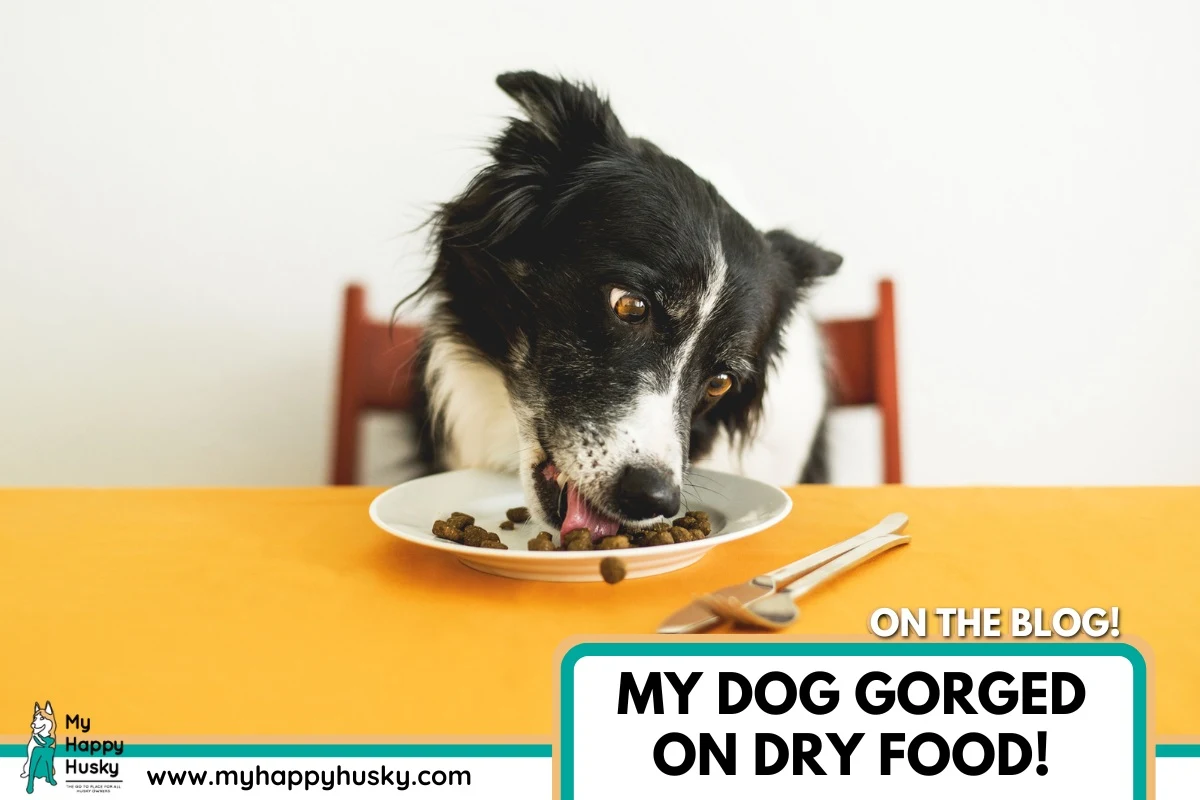Hey there, fellow dog parents! Today, let’s talk about a concern that I’ve personally faced as a dog owner: my pup gorging on dry food. Trust me, it’s not something to ignore. Let’s dive in and talk about the dangers and what you can do if you find yourself in a similar situation.

The 3 Dangers of Overeating Dry Food
Let’s run through the main reasons behind overeating dry dog food, or any dry food for that matter. It’s important we understand the risks behind what seem like regular behavior.
And yes, if your dog is overeating, then we do recommend to do something about it and not let this behavior slide! Here’s why:
Gut Issues
First up, gastrointestinal problems. Overeating can cause an upset stomach, vomiting, or diarrhea. Your dog’s tummy is not made to handle a lot of food at once. Think of it like you eating three pizzas in one go. Not comfy, right?
Weight Gain
Then there’s the risk of obesity. Eating too much can lead to weight gain. And we all know obesity is a big no-no. It comes with other health issues like joint pain and diabetes.
Bloat
Lastly, and most importantly, is bloat. It’s a serious condition. The stomach fills with gas and twists. This is an emergency. Your dog will need surgery right away. According to PetMD, bloat is a life-threatening situation that requires immediate attention. Some extra info from Canine Journal.
4 Reasons Why Your Dog Is Overeating
Let’s run through what drives your dog to engage in overreating. To really understand the cause you’ll need to take everything into context. Consider your dog’s general behavior, breed, daily routine, and recent events to pin point the cause for your situation.
It’s in Their DNA
Ever wonder why your pup acts like every meal is their last? Well, it’s not just them being overly dramatic. It’s actually deep-rooted in their DNA. You see, dogs’ ancestors had to scavenge and hunt for food. They didn’t know when their next meal would come.
Vet Focus goes into more detail about this.
Feast or Famine
Back in the day, it was a feast-or-famine world for dogs. When they found food, they ate as much as they could. It was a survival thing. They needed to store energy for times when food was hard to find.
Modern-Day Behavior
Fast forward to today, and our pets have regular meal times and snacks. But those old instincts don’t just go away. That’s why some dogs act like they’re starving even when they eat regularly. They’re wired to think, “Better eat this now, who knows when I’ll get more!”
Interesting: Is Chalk Toxic to Dogs
Adaptation
Understanding this can help you adapt how you feed your dog. It’s not just about filling the bowl. It’s about working with their natural behavior to make sure they’re eating the right amount at the right pace.
What To Do If Your Dog Overeats: 4 Steps To Take
Now let’s explain what owners can do if their dog is gorging on food. As we’ve explain this can be a serious issue with serious consequences, so follow the steps below to get your dog back on track.
Keep Calm
The first thing you need to do is stay calm. Yes, it’s scary. But freaking out won’t help your dog. Take a deep breath.
Check for Signs of Bloat
Look for symptoms of bloat. These include a hard belly, drooling, and pacing. If you see any of these signs, go to the vet right away. This is an emergency.
Limit Activity
Next, limit your dog’s activity. Too much moving around can make things worse. Make sure your dog stays as calm as possible.
Call Your Vet
Lastly, call your vet. Even if your dog seems fine, it’s good to check in. Your vet can tell you what to look out for and when to bring your dog in for a check-up.
Popular: Do Dog’s Circle Before Dying? (The Truth)
Preventing Future Incidents
Prevention is better than cure, so take a look at the following tips to prevent this issue from happening again in the future. Some of the tips are very simple and effective, like the first one!
Store Food Properly
Now, prevention is key. Make sure to store the dry food where your dog can’t get to it. Use containers with lids. Out of sight, out of mind, right?
Use a Slow Feeder
Consider getting a slow feeder bowl. These bowls make your dog eat slower. It gives their tummy time to send the “I’m full” signal to their brain.
Monitor Meal Times
Lastly, monitor meal times. Make sure you’re following the feeding guidelines on the dog food package or what your vet suggests. Don’t leave food out where your dog can eat whenever they want.
Final Thoughts
Our dogs are like family. We want to keep them safe and healthy. So if your pup goes to town on a bag of dry food, know the risks and what steps to take. And hey, prevention is better than cure. Keep that food locked up and stick to a meal schedule. Your doggy will thank you for it.
Disclaimer
The advice given in this article is for educational purposes only and does not constitute professional advice in any context. Before making any decisions that may affect the health and/or safety of your dog, you should always consult a trained veterinarian in your local area. For the FULL disclaimer Visit HereCopyright Notice: The content produced and published on My Happy Husky is unique and original. My Happy Husky makes an active effort to search for plagiarized content using plagiarism detection software. If plagiarized content is found, action will be taken.
